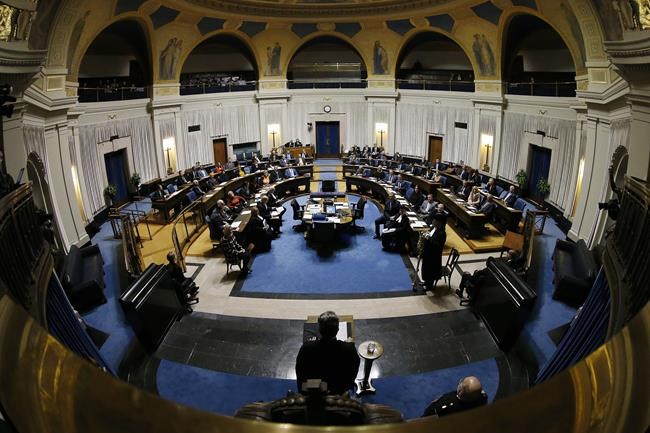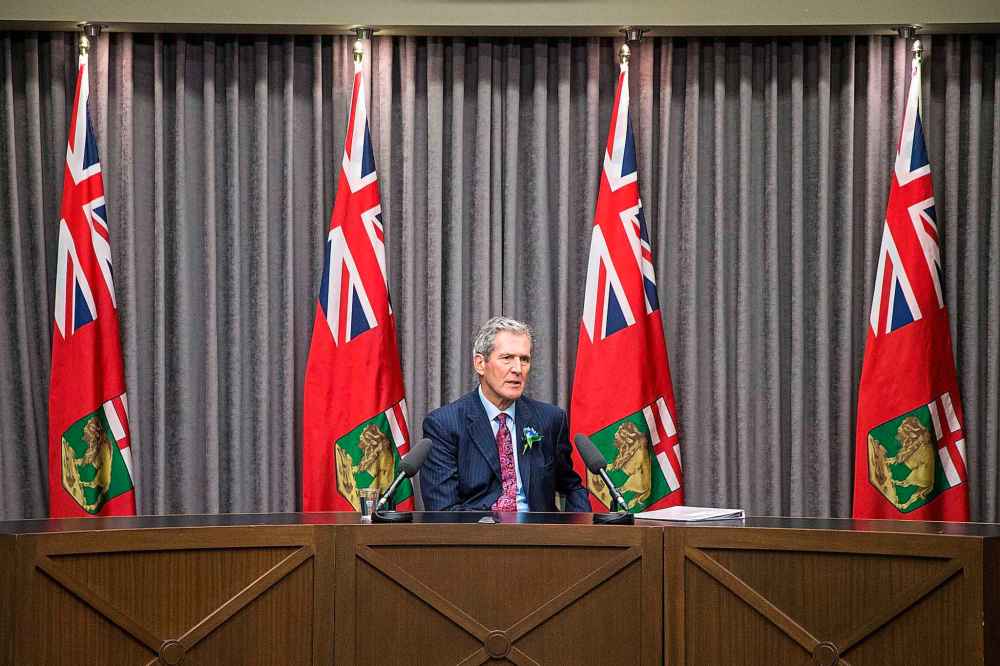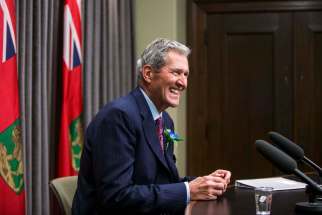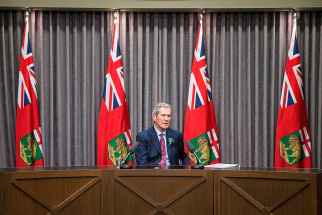Pallister signals he’s ready to ease choke-hold on infrastructure spending
Read this article for free:
or
Already have an account? Log in here »
To continue reading, please subscribe:
Monthly Digital Subscription
$0 for the first 4 weeks*
- Enjoy unlimited reading on winnipegfreepress.com
- Read the E-Edition, our digital replica newspaper
- Access News Break, our award-winning app
- Play interactive puzzles
*No charge for 4 weeks then price increases to the regular rate of $19.00 plus GST every four weeks. Offer available to new and qualified returning subscribers only. Cancel any time.
Monthly Digital Subscription
$4.75/week*
- Enjoy unlimited reading on winnipegfreepress.com
- Read the E-Edition, our digital replica newspaper
- Access News Break, our award-winning app
- Play interactive puzzles
*Billed as $19 plus GST every four weeks. Cancel any time.
To continue reading, please subscribe:
Add Free Press access to your Brandon Sun subscription for only an additional
$1 for the first 4 weeks*
*Your next subscription payment will increase by $1.00 and you will be charged $16.99 plus GST for four weeks. After four weeks, your payment will increase to $23.99 plus GST every four weeks.
Read unlimited articles for free today:
or
Already have an account? Log in here »
Hey there, time traveller!
This article was published 19/11/2019 (2216 days ago), so information in it may no longer be current.
Premier Brian Pallister’s government may finally be loosening the purse strings on infrastructure spending. In its throne speech Tuesday, the province pledged to spend “billions more” annually on infrastructure projects.
Province targets infrastructure bump, post-secondary accountability in throne speech

Posted:
The Progressive Conservative government is moving to implement much of its election campaign platform, setting dates for some promised tax cuts and pledging action to make Winnipeg's streets safer.
It’s a commitment that could signal an end to the Tories’ cuts to infrastructure spending, including massive underspending on capital projects in health care and education over the past two years.
“Building roads, bridges and highways go hand-in-hand with economic development and job creation,” said Chief Justice Richard Chartier, who delivered the throne speech on behalf of government.
“Billions more will be invested annually by your government as we launch an ambitious program of infrastructure development including hospitals, schools, universities and Crown corporations.”
That’s a major departure for a government that underspent its infrastructure budget last year by $566 million, and $487 million in 2017-18.
The province budgeted $1.6 billion in strategic infrastructure in 2018-19. But it spent only $1.07 billion of that, according to the province’s public accounts. The biggest impact was in health care. Government budgeted $319 million in health capital projects, but left nearly $200 million on the table. In education, $168 million was budgeted, $122 million was spent. The province spent most of its $355 million highways budget last year. But only $47 million of its $104 million water-related infrastructure budget was used.
It was similar in 2017-18. The province budgeted $1.68 billion in strategic infrastructure projects but spent just $1.19 billion.

That wasn’t all by design. In some cases, certain planned projects don’t materialize during the fiscal year; so they lapse to the next year. It’s unlikely government wanted to underspend as much as it did. Still, the amount it did fall below budget was significant.
That isn’t to say the Tories haven’t made a concerted effort to reduce capital spending. They had little choice. The previous NDP government increased capital spending by more than 400 per cent from 2004 to 2016. Because capital spending is financed entirely with borrowed money, that increase sent the province’s debt soaring. The NDP’s annual operating deficits also contributed to the growth in debt. But as the Manitoba auditor general pointed out in a recent report, the billions borrowed to finance infrastructure spending over the past decade was the single biggest contributor.
Cutting infrastructure spending doesn’t come without costs, though. Underspending the capital budget as much as the Pallister did over the past two years has economic consequences. Cutting highways spending affects economic growth. That’s why the Tories pledged in the throne speech to make good on their election commitment to increase the highways budget from $350 million to $400 million.
Infrastructure spending had to be curbed. The rate at which the province was borrowing was unsustainable. The province’s debt as percentage of the economy (GDP) — a key indicator of a government’s indebtedness — grew from 21.6 per cent in 2008 to 34.6 per cent in 2018. It would have grown further had government not put the brakes on capital spending and reduced the operating deficit (both of which contribute to the province’s net debt). That would have likely resulted in further credit rating downgrades.
Still, the Pallister government probably went too far in curbing capital spending. It now appears it will restore some of that. In addition to improved highways spending, the province is promising to build more schools and spend more on hospital and university upgrades.
Still, the Pallister government probably went too far in curbing capital spending. It now appears it will restore some of that. In addition to improved highways spending, the province is promising to build more schools and spend more on hospital and university upgrades.
Debt will continue to rise (even after the books are balanced, likely by 2022). But it will rise at a more sustainable rate.
Cleaning up the financial mess of a previous government is never an easy task. It can rarely be done error-free or without overreaching, at times. The magnitude of the financial disaster left behind by the previous regime made the task that much more difficult.
The key for government is making adjustments along the way, including pulling back on austerity measures when necessary. It looks like the Pallister government is now taking those steps.
tom.brodbeck@freepress.mb.ca

Tom has been covering Manitoba politics since the early 1990s and joined the Winnipeg Free Press news team in 2019.
Our newsroom depends on a growing audience of readers to power our journalism. If you are not a paid reader, please consider becoming a subscriber.
Our newsroom depends on its audience of readers to power our journalism. Thank you for your support.









